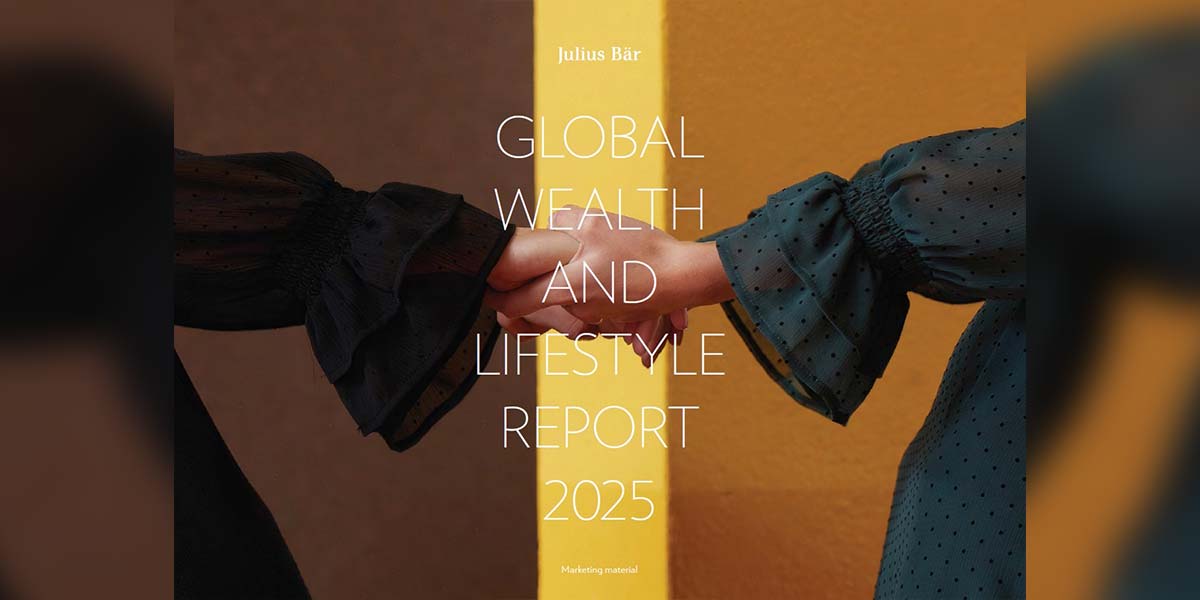- “Longevity” Trend Significantly Impacts Life and Financial Planning
- Bangkok Ranks 11th Globally for Cost of Living; Singapore Retains Top Spot
SCB Julius Baer Co., Ltd., a joint venture between Siam Commercial Bank, subsidiary of SCB X Public Company Limited (SET: SCB), and Julius Baer, has released the “Global Wealth and Lifestyle Report 2025” by Julius Baer. The report uncovers evolving behavioral trends among Ultra-High-Net-Worth Individuals (UHNWIs) and High-Net-Worth Individuals (HNWIs) worldwide, particularly in the rapidly growing Asia Pacific region.
A key finding is the significant impact of the longevity trend on life and financial planning, aligning with a shifting definition of luxury from material consumption to invaluable experiences. Bangkok has climbed to 11th globally for the cost of living, while Singapore maintains its position as the most expensive city for the third consecutive year, reflecting the dynamic and continuous growth of the Asia Pacific wealth market.
Asia Pacific Remains the Heart of the Global Economy with Sustained GDP Growth Driving a Surge in Wealth
The Asia Pacific region continues to be the fastest-growing globally. Despite a slight economic moderation in 2024, its growth still outpaces the global average. This strong performance is a key factor driving the rapid increase in wealth across the region, with GDP growing 4.5% in 2024, a slight decrease from 5.1% in 2023, but notably higher than the global average of 3.3%.
This trend directly impacts the number of HNWIs in Asia, projected to increase by 5% year-on-year to 855,000 in 2024. Significant drivers include economic growth in China and India, expected to contribute to Asia’s share of new HNWIs globally, reaching an estimated 47.5% between 2025 and 2028. These figures underscore Asia Pacific’s continued role as a hub of economic opportunity and a crucial source of global wealth.
Bangkok Ranks 11th Globally for Cost of Living
The report reveals shifts in the rankings of expensive cities for HNWIs, with Bangkok climbing six places to 11th globally, a significant change for the region. The report notes that Bangkok has become one of the world’s most expensive cities for luxury goods such as ladies’ and men’s fashion, as well as cars and watches.
Among other cities in Asia Pacific, Singapore continues to rank 1st for the third consecutive year, Hong Kong is 3rd (down from 2nd), Tokyo moved up six places to 17th, and Shanghai dropped from 4th to 6th.
Shifting Spending Patterns Among Asia Pacific’s Wealthy
HNWIs in Asia Pacific show a tendency to increase both spending and investing (39%), with the highest overall increase in investing at 68%. Investors in this region are also more inclined to invest in future trends or in alignment with their values compared to other regions.
Equities remain the most preferred asset class, followed by real estate and cash. Furthermore, despite “ESG fatigue” observed in many other regions worldwide, Asia Pacific demonstrates a continuously increasing commitment to sustainable investing, reflecting a long-term vision and awareness of the importance of generating positive impact alongside financial returns.
The Longevity Trend and Quality of Life Influence Life and Financial Planning
HNWIs in Asia Pacific prioritize longevity and quality of life. One hundred percent of respondents in the region reported taking measures to increase their lifespans, ranging from lifestyle changes like regular exercise and healthy eating to more extreme measures such as gene therapy and cryogenic chambers, utilized by 21% of respondents.
Regarding financial longevity, most HNWIs stated they would adjust their wealth management strategies to accommodate extended lifespans. Respondents in Asia Pacific are more likely to create a long-term care plan, with 68% positively checking this option.
Global Elites Shift Focus from “Luxury Goods” to “Invaluable Experiences”
The report confirms a global trend of shifting from material consumption towards a focus on experiences. While spending on luxury goods has slowed, demand for fine dining, exclusive travel, and curated experiences continues to grow.
This reflects an evolving definition of “luxury” among HNWIs, who no longer view luxury solely as the possession of objects. Instead, they increasingly prioritize lifestyle, well-being, and meaningful experiences that offer deeper psychological value and create lasting memories over material ownership.
Future Opportunities and Challenges
The wealth landscape in Asia is undergoing significant transformation. While traditional businesses remain foundational, new opportunities emerging from technology are diversifying and modernizing the profile of Asian HNWIs.
Concurrently, the intergenerational wealth transfer, projected to see over $5.8 trillion USD in assets change hands between 2023 and 2030, will accelerate a shift towards new preferences in lifestyle and spending choices. These include a growing focus on sustainability, increased digitalization, and a bias towards experiences over possessions.
These trends will profoundly influence global luxury markets, real estate, and investment strategies in the coming years, paving the way for new opportunities and challenges.
SCB Julius Baer: Your Partner in Navigating the Evolving Wealth Landscape
As the only Swiss Private Bank operating in Thailand, SCB Julius Baer is well-positioned to address the significant shifts in the global wealth landscape. We are committed to serving High-Net-Worth clients in Thailand through comprehensive services, including investment advisory, discretionary mandates, and wealth planning.
Our expertise covers structuring asset ownership, financial planning, and intergenerational wealth transfer. SCB Julius Baer’s highly skilled team of Relationship Managers (RMs) and Investment Advisors (IAs) are ready to provide expert guidance and advice to our esteemed clients, helping them evaluate portfolio returns and effectively plan for sustainable wealth transfer to the next generation.






